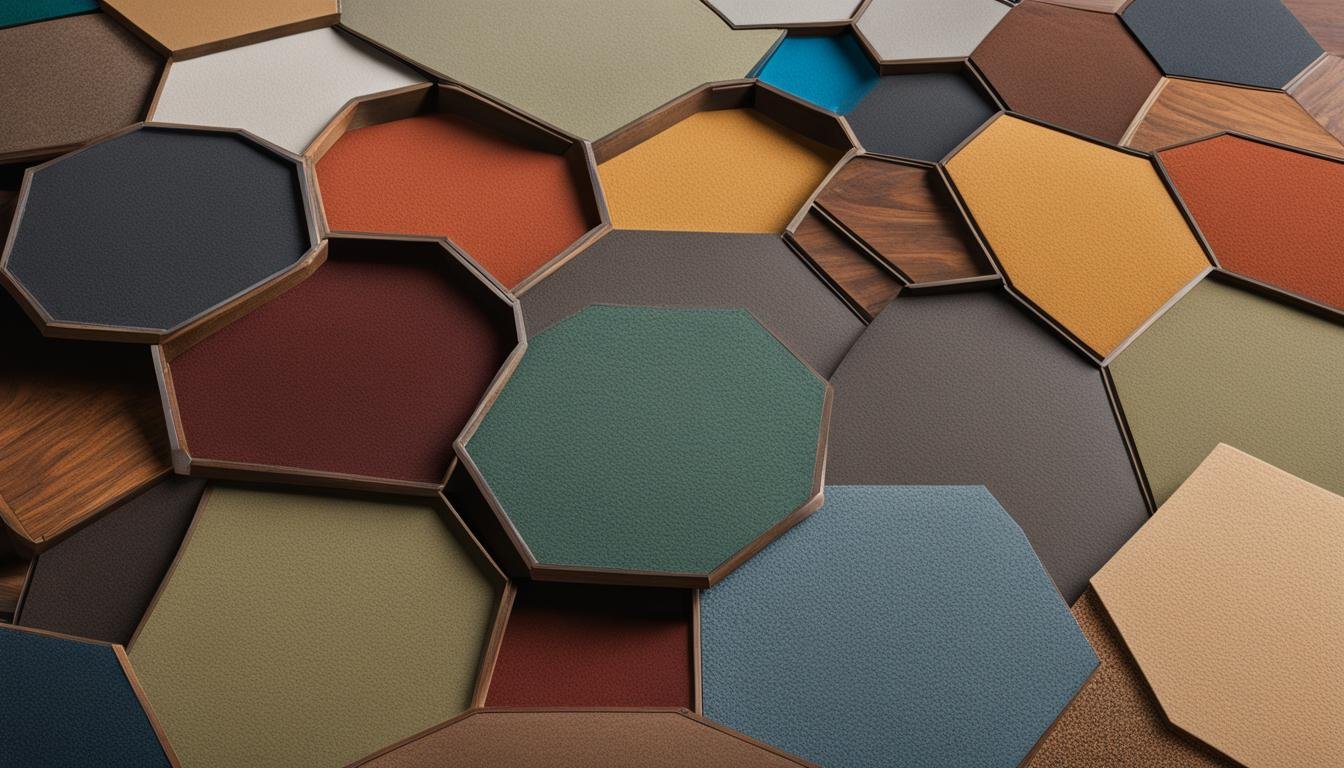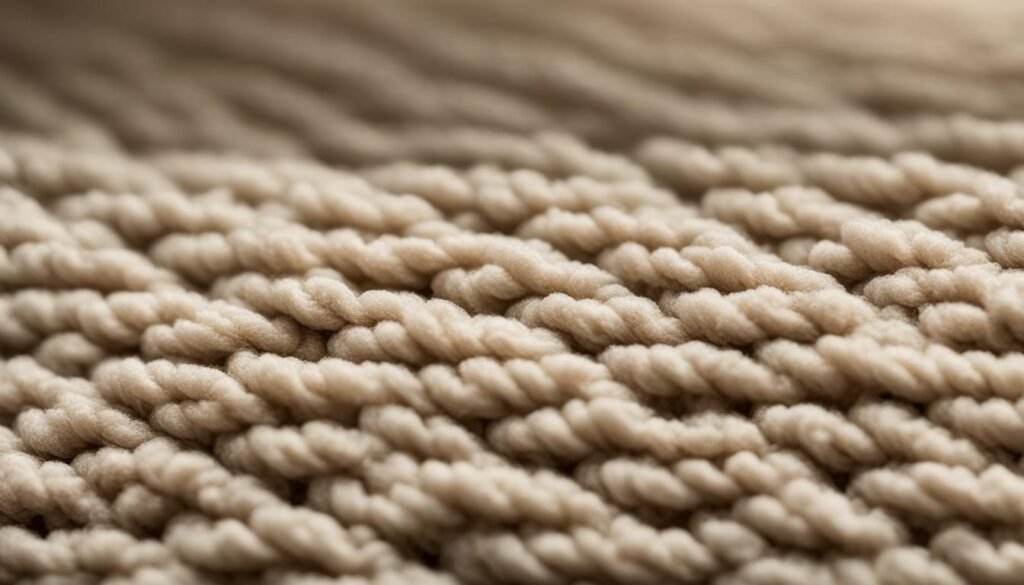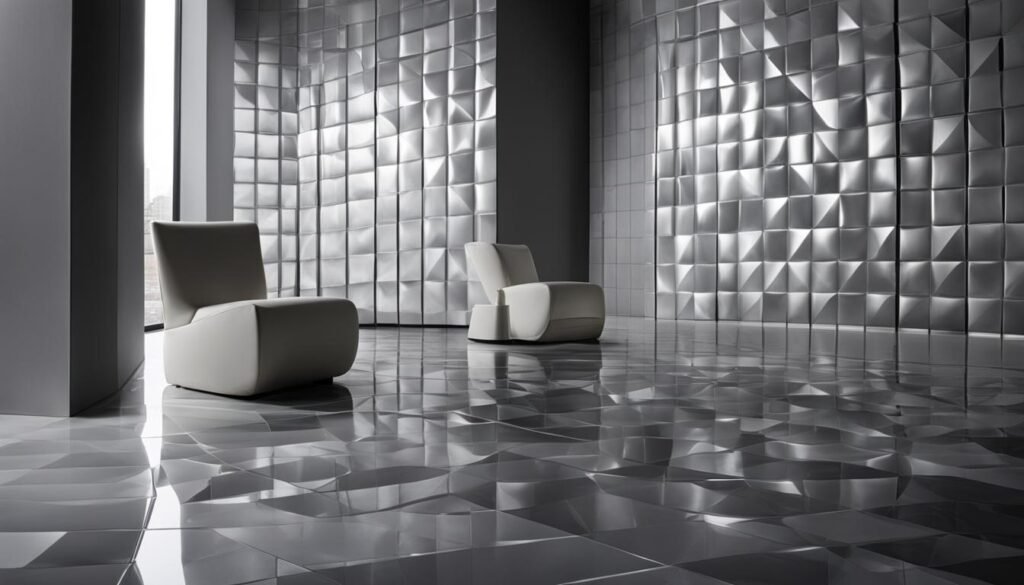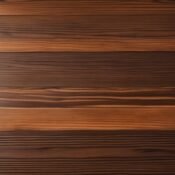
Expert Guide to Flooring Types and Materials | Your Finest Choice
Flooring is an essential design element in any home, offering both functionality and aesthetic appeal. With so many options available, it can be overwhelming to choose the right flooring type and material. This guide will provide expert advice on the different flooring options, their pros and cons, and their suitability for various rooms in your home or commercial buildings.
Key Takeaways:
- There are various flooring types and materials to choose from.
- Different flooring materials have their own pros and cons.
- The best flooring materials depend on the room and its specific requirements.
- Durable flooring types are recommended for high-traffic areas.
- Consider factors like durability, affordability, and ease of maintenance when selecting flooring.
Hardwood Flooring
Hardwood flooring is a popular choice among homeowners due to its timeless appeal and durability. It adds warmth and beauty to any space, making it suitable for various rooms in your home. Hardwood flooring comes in two main options: solid wood and engineered wood.
Solid wood flooring is made from a single piece of wood and offers unmatched authenticity. It can be sanded and refinished multiple times, making it a long-lasting investment. However, solid wood flooring tends to be more expensive and is susceptible to dents and scratches.
Engineered wood flooring, on the other hand, consists of a thin veneer of real wood bonded to plywood layers. It is more stable and resistant to moisture compared to solid wood. Engineered wood offers a wider range of options in terms of finishes and colors and is generally more affordable. However, it cannot be sanded and refinished as many times as solid wood flooring.
| Type of Wood | Durability | Cost (per square foot) |
|---|---|---|
| Oak | Durable | $5 – $10 |
| Ash | Durable | $5 – $10 |
| Maple | Moderately durable | $6 – $9 |
| Walnut | Durable | $7 – $10 |
When choosing hardwood flooring, consider factors such as the room’s foot traffic, humidity levels, and your budget. Additionally, proper care and maintenance are crucial to preserve the beauty and lifespan of your hardwood floors.
Laminate Flooring
Laminate flooring is an affordable alternative to hardwood that offers a wide range of benefits. It features a photo of wood or other materials with a protective plastic coating, giving it a realistic appearance. Laminate flooring is highly scratch-resistant, making it suitable for high-traffic areas such as living rooms, hallways, and kitchens. This durability is especially important for homes with children or pets. Additionally, laminate flooring is known for its affordability, making it a cost-effective choice for homeowners.
One of the key advantages of laminate flooring is its scratch resistance. The protective plastic coating helps prevent scratches from everyday wear and tear, ensuring that your floors maintain their appearance over time. This makes laminate flooring an excellent choice for busy households or commercial spaces that require a durable and low-maintenance flooring option.
Another notable feature of laminate flooring is its affordability. Compared to other flooring materials, such as hardwood or stone, laminate flooring is a more budget-friendly option. With its realistic wood appearance and protective coating, laminate flooring offers excellent value for money. Its affordability, along with its scratch resistance, makes it an ideal choice for homeowners looking to enhance the aesthetics of their spaces without breaking the bank.
| Pros | Cons |
|---|---|
| High scratch resistance | Not as authentic-looking as real wood |
| Affordable | Cannot be refinished |
| Easy to clean and maintain | May have a hollow sound |
| Wide range of styles and designs | Not suitable for areas with high moisture |
In conclusion, laminate flooring is a popular choice for its affordability, scratch resistance, and wide range of designs. It provides a cost-effective solution for homeowners who want the look of hardwood without the high price tag. With its protective plastic coating, laminate flooring can withstand the demands of daily life while maintaining its appearance. Whether you’re renovating your home or upgrading a commercial space, laminate flooring is a durable and budget-friendly option that offers both style and functionality.
Vinyl Flooring: A Resilient and Waterproof Option
When it comes to choosing flooring that is both durable and easy to install, vinyl flooring is a top choice. With its wide range of benefits, vinyl flooring has become increasingly popular in residential and commercial spaces. Its versatility, resilience, and water-resistant properties make it an excellent option for various rooms in your home or office.
Vinyl flooring is available in different forms, but one of the most popular options is luxury vinyl tiles (LVT). LVT consists of multiple layers, including a high-definition printed image layer that closely resembles real wood or other materials, and a durable top layer that protects against wear and tear. This combination provides the visual appeal of natural materials with the added benefits of vinyl.
One of the standout features of vinyl flooring is its waterproof nature. This makes it an ideal choice for areas prone to moisture, such as bathrooms, kitchens, and basements. Unlike hardwood or laminate flooring, vinyl flooring can withstand spills, humidity, and even occasional flooding without warping or damage. Its water-resistant properties make cleaning a breeze, allowing you to maintain a beautiful and hygienic space with minimal effort.
Advantages of Vinyl Flooring:
- Resilient and durable, able to withstand heavy foot traffic and resist scratches and dents.
- Waterproof, making it suitable for areas prone to moisture.
- Easy installation, with options for glue-down, loose-lay, or click-lock systems.
- Wide range of styles and designs, including LVT that closely resembles real wood or stone.
- Low maintenance, requiring simple cleaning routines to keep it looking its best.
Whether you’re looking to update your kitchen, bathroom, or any other room in your home or office, vinyl flooring provides a versatile, affordable, and long-lasting solution. Its resilient and waterproof properties, combined with easy installation and low maintenance requirements, make it a top choice for both homeowners and business owners alike.
Carpet
Carpet is a popular flooring choice known for its comfort and cost-effectiveness. It provides a soft and cozy feel underfoot, making it perfect for bedrooms and living areas where comfort is valued. There are two main types of carpet: tufted carpet and woven carpet.
Tufted carpet is the most common type of carpet in the United States. It is made by inserting yarn through a backing material and then securing it with adhesive. Tufted carpet offers a wide range of colors, patterns, and textures, allowing you to find the perfect style for your space. It is also relatively affordable compared to other flooring options.
Woven carpet, on the other hand, is more commonly used in Europe. It is made on a loom by interlacing yarns, resulting in a dense and durable carpet. Woven carpet is known for its intricate designs and patterns, adding a touch of elegance to any room. While woven carpet may be pricier than tufted carpet, it offers exceptional durability and longevity.
| Type | Advantages | Disadvantages |
|---|---|---|
| Tufted carpet | – Wide variety of styles – Affordable – Comfortable underfoot |
– Less durable than woven carpet – May show wear and tear |
| Woven carpet | – Luxurious look and feel – Exceptional durability – Intricate designs |
– Higher price point – Limited color options |
Quote: “Carpet adds warmth and comfort to any space, making it the perfect flooring choice for bedrooms and cozy living areas.” – Interior Design Expert
Both tufted carpet and woven carpet offer stain resistance, making them suitable for high-traffic areas and homes with children or pets. It’s important to consider the specific needs and requirements of your space when choosing between these two carpet options.
With its ability to provide comfort, cost-effectiveness, and stain resistance, carpet remains a popular choice for many homeowners. Whether you opt for the versatility of tufted carpet or the elegance of woven carpet, you can create a cozy and inviting atmosphere in any room of your home.

Stone Flooring
Stone flooring offers a unique blend of durability, value, and unique character that can enhance the aesthetics of any space. With options such as limestone, travertine, granite, marble, and slate, homeowners have a variety of choices to suit their preferences and design styles.
One of the key advantages of stone flooring is its durability. Stone is resistant to heavy foot traffic and fading, making it a long-lasting flooring option. Additionally, stone flooring does not harbor dust mites or pet hair, making it a good choice for individuals with allergies. However, it is important to note that stone flooring can be relatively expensive and may require professional installation. To maintain its appearance and resist stains, stone flooring may also need to be sealed periodically.
Types of Stone Flooring
There are several types of stone flooring to choose from, each with its own unique characteristics:
- Limestone: Limestone offers a warm and rustic look with its natural earthy tones. It is suitable for both indoor and outdoor applications.
- Travertine: Travertine provides a luxurious feel with its unique patterns and textures. It is often used in high-end residential and commercial settings.
- Granite: Granite is known for its durability and striking appearance. It can withstand heavy foot traffic and is commonly used in kitchen countertops.
- Marble: Marble exudes elegance and sophistication. It is a popular choice for bathrooms, foyers, and other areas where a touch of luxury is desired.
| Stone Type | Durability | Price Range (per sq. ft.) |
|---|---|---|
| Limestone | Medium | $3 – $6 |
| Travertine | Medium | $4 – $8 |
| Granite | High | $5 – $10 |
| Marble | High | $6 – $12 |
When considering stone flooring for your home, it is important to weigh the benefits of durability, visual appeal, and value against the cost and maintenance requirements. With proper care and maintenance, stone flooring can elevate the look and feel of your space for years to come.
Concrete Flooring
Concrete flooring has gained popularity as a fashionable and customizable option for floors and kitchen countertops. Its polished finish adds a sleek and modern touch to any space. With concrete flooring, you have the opportunity to customize the color and design, making it unique to your style. Its durability is unmatched, able to withstand heavy foot traffic and resist scratches and dents.
One of the key benefits of concrete flooring is its low maintenance. It is easy to clean and requires minimal upkeep, making it an attractive choice for busy homeowners. Additionally, concrete flooring is an excellent option for those seeking durability, as it can withstand the test of time. With regular maintenance and resealing, concrete floors can maintain their polished finish for years to come.
Concrete flooring offers endless possibilities for customization, allowing you to create a space that reflects your individuality and style. Its durability and low maintenance make it a practical choice for both residential and commercial properties.
Concrete Flooring Durability Comparison
| Flooring Type | Durability |
|---|---|
| Concrete | High |
| Hardwood | Moderate |
| Laminate | Low |
| Carpet | Low |
| Tile | High |
As seen in the durability comparison table above, concrete flooring ranks high, surpassing other popular flooring types such as hardwood, laminate, carpet, and tile. Its resilience and ability to withstand daily wear and tear make it a reliable choice for long-term use.
In conclusion, if you are looking for a polished, customizable, and durable flooring option, concrete flooring is a fantastic choice. Its versatility allows it to blend seamlessly into various design styles, making it suitable for both residential and commercial spaces.
Tile Flooring: The Classic, Water-Proof, Low-Maintenance Choice
Tile flooring is a timeless option that offers a classic look, water-proof properties, and low-maintenance requirements. It is available in two main types: ceramic tile and porcelain tile. Both options provide durability and versatility, making them suitable for various rooms in your home.
Ceramic tile is made from a mixture of water and sand, resulting in a durable and affordable flooring solution. It comes in a wide range of colors, designs, and sizes, allowing for endless customization possibilities. Porcelain tile, on the other hand, is made from a finer, denser clay, making it even more resistant to scratches and dents.
One of the major benefits of tile flooring is its water-proof nature, making it ideal for areas with high moisture exposure, such as bathrooms, kitchens, laundry rooms, and mudrooms. Additionally, tile flooring is low-maintenance, requiring only regular cleaning to keep it looking its best.

Advantages of Tile Flooring:
- Classic look
- Water-proof
- Low-maintenance
- Options for customization
- Durable and long-lasting
Tile flooring is a popular choice for homeowners who want a beautiful and practical flooring option. Its classic appearance, water-proof properties, and low-maintenance requirements make it a reliable choice for any room in your home.
Table: Comparison of Ceramic Tile and Porcelain Tile
| Type | Advantages | Disadvantages |
|---|---|---|
| Ceramic Tile | Affordable | Less resistant to scratches |
| Porcelain Tile | More durable | Higher cost |
Cork Flooring
Cork flooring is an excellent choice for those seeking a renewable and eco-friendly material. Made from the bark of cork trees, this flooring option is both sustainable and environmentally conscious. Cork is harvested without harming the tree, allowing it to regenerate and be harvested again in the future. It’s a renewable resource that can be continually utilized, making it a responsible choice for environmentally conscious homeowners.
In addition to its sustainability, cork flooring offers exceptional comfort. It has a natural springiness that provides a cushion-like feeling underfoot, making it gentle on the joints and reducing fatigue. This added comfort makes it particularly appealing for areas where individuals may spend extended periods, such as kitchens or home offices. The resilience of cork flooring also contributes to its comfort, as it can absorb impact and relieve pressure on the feet.
One of the standout features of cork flooring is its water resistance. The cellular structure of cork makes it naturally resistant to moisture, making it suitable for areas prone to spills and humidity, such as bathrooms or laundry rooms. Its water-resistant properties help prevent damage and warping, providing long-lasting durability. However, it’s important to note that while cork flooring is water-resistant, it is not entirely waterproof. It’s essential to promptly clean up any spills to maintain its integrity.
The Benefits of Cork Flooring:
- Renewable and sustainable material
- Comfortable and gentle on the joints
- Naturally water-resistant
Cork flooring is not only an eco-friendly choice but also provides exceptional comfort and water resistance. Its sustainability, cushion-like feel, and durability make it a preferred option for various rooms in a home, from kitchens to bathrooms. If you’re looking for a flooring material that combines environmental responsibility, comfort, and functionality, cork flooring is an excellent choice.
| Pros | Cons |
|---|---|
| Renewable material | Not entirely waterproof |
| Comfortable underfoot | |
| Water-resistant | |
| Durable |
Best Flooring for Each Room of the House
When it comes to choosing the best flooring for each room of your house, there are several factors to consider such as durability, moisture exposure, and style. Here are some recommendations for the most suitable flooring types for different rooms:
Entryways, Living Rooms, and Dining Rooms:
- Hardwood: Hardwood flooring adds a touch of elegance to these high-traffic areas. It provides warmth and beauty, with options like oak, ash, maple, and walnut.
- Ceramic Tile: Ceramic tile offers durability and a classic look. It is easy to clean and comes in various designs, making it a popular choice for these areas.
Family Rooms, Media Rooms, Offices, and Bedrooms:
- Laminate: Laminate flooring is a cost-effective option that mimics the look of hardwood. It is scratch-resistant and easy to install, making it suitable for these versatile spaces.
- Carpet: Carpet provides comfort and warmth, making it perfect for bedrooms and areas where you want to create a cozy atmosphere. It comes in a wide range of colors and styles.
Kitchens, Bathrooms, Laundry Rooms, and Mudrooms:
- Vinyl: Vinyl flooring, especially luxury vinyl tiles (LVT), is the ideal choice for these moisture-prone areas. It is waterproof, easy to maintain, and can closely resemble real wood or stone.
- Porcelain Tile: Porcelain tile is highly durable and water-resistant, making it a popular option for kitchens and bathrooms. It comes in various designs and can withstand heavy foot traffic.
Garages:
- Concrete: Concrete flooring, especially polished concrete or epoxy coatings, is a durable and low-maintenance option for garages. It can withstand heavy loads and is resistant to stains.
- Vinyl Tile: Vinyl tile is another suitable choice for garage floors. It is easy to clean, offers good traction, and provides a comfortable surface for walking or working.
Basements:
- Polished Concrete: Polished concrete is a popular option for basements. It is durable, easy to clean, and resistant to moisture. It can also be stained or dyed for a more decorative finish.
- Engineered Wood: Engineered wood flooring can be a good choice for basements if you want the look of hardwood. It is more resistant to moisture than solid wood.
Home Gyms:
- Rubber or Vinyl Tile: Rubber or vinyl tile flooring is ideal for home gyms. It provides shock absorption, traction, and easy maintenance.
Screened Rooms:
- Ceramic Tile: Ceramic tile is a versatile option for screened rooms. It is durable, easy to clean, and can withstand temperature changes and exposure to the elements.
- Indoor/Outdoor Carpet: Indoor/outdoor carpet is another option for screened rooms. It offers comfort and is designed to withstand outdoor conditions.
Choosing the most suitable flooring for each room of your house is crucial for creating a functional and aesthetically pleasing space. Consider factors such as durability, moisture resistance, and maintenance requirements to make the best choice for your needs and preferences.
Conclusion
Choosing the right flooring type and material for your space is a significant decision that can impact both the look and functionality of your home. With our expert guide to flooring types and materials, you can make informed choices that suit your needs and preferences.
Durability is a key factor to consider when selecting flooring. Options like hardwood, stone, and concrete offer long-lasting solutions that can withstand heavy foot traffic, while laminate, vinyl, and carpet provide affordable alternatives that are suitable for various rooms.
Affordability is another important consideration. Laminate and vinyl flooring are budget-friendly choices that provide durability and aesthetics. Additionally, carpet offers comfort and cost-effectiveness, while cork flooring provides a unique and eco-friendly option.
Remember, it’s essential to select the right flooring material for each room. Hardwood and ceramic tile are ideal for living areas, while bathrooms and kitchens benefit from waterproof surfaces like porcelain tile and vinyl. Basements and garages have specific requirements that can be met with polished concrete or vinyl tile.
FAQ
What are the different types of flooring options available?
There are various types of flooring options available, including hardwood, laminate, vinyl, carpet, stone, concrete, tile, and cork.
What is hardwood flooring and what are its advantages and disadvantages?
Hardwood flooring is a classic choice made from solid wood or engineered wood. It offers warmth and beauty, but it can be expensive and prone to dents and scratches.
What is laminate flooring and what are its benefits?
Laminate flooring is an affordable alternative to hardwood. It features a photo of wood with a protective plastic coating and is highly resistant to scratches and dents.
What is vinyl flooring and why is it popular?
Vinyl flooring, also known as resilient flooring, is a fast-growing option. It is affordable, waterproof, resistant to stains, scratches, and dents, and easy to install.
What are the features of carpet and where is it commonly used?
Carpet is popular for its comfort and affordability. It adds warmth to any space and is commonly used in bedrooms and living areas.
What are the advantages of stone flooring?
Stone flooring, such as limestone, travertine, granite, marble, and slate, offers durability, adds value to a home, and is a good choice for allergy sufferers.
How is concrete flooring different from other options?
Concrete flooring is a fashionable and customizable option. It is durable, easy to maintain, and conducts heat well, making it suitable for radiant heating.
What are the features of tile flooring?
Tile flooring, including ceramic and porcelain, offers a classic look, is water-proof, and low-maintenance. Porcelain tile is more resistant to scratches and dents.
What makes cork flooring unique?
Cork flooring is a unique and eco-friendly option made from the bark of cork trees. It is known for its comfort, water resistance, and suitability for kitchens and bathrooms.
What type of flooring is best for each room of the house?
The best flooring choice for each room depends on factors such as moisture exposure, durability, and style. Hardwood and ceramic tile are popular choices for entryways, while laminate and carpet are suitable for family rooms and bedrooms.
How do I choose the right flooring type and material for my space?
When choosing flooring, consider factors such as durability, affordability, ease of maintenance, and suitability for different rooms. Understanding the pros and cons of each option will help you make an informed choice.
Source Links
- https://www.geminifloors.com/best-flooring-for-each-room/
- https://www.realhomes.com/advice/types-of-flooring
- https://www.goodhousekeeping.com/home/renovation/a40617015/best-flooring-guide/
Recent Posts
Seattle Carpet Cleaners Discussion Forum
Seattle Carpet Cleaners Discussion Forum
Seattle Hardwoods: Premium Wood Flooring & Lumber
All Categories
Become A Preferred Partner
A great partnership for qualified vendors only
